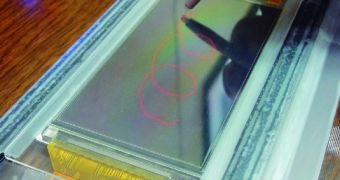There's no denying the fact that capacitive touchscreens offer far improved functionality when compared to their resistive counterparts but this technology doesn't come without its downsides as gloves and normal styluses are not supported, but Hitachi managed to overcome this issues in their latest projection-type touch panel capable of detecting insulators such as plastic and cloth.
This limitation comes from the technology used for detecting inputs, projection-type capacitive screens working only with conductive bodies such as your skin.
In order to get pass this inconvenient, Hitachi build a projection-type touch panel that uses a “modified structure and added components,” without increasing the panel's thickness or size.
Performance and durability have also remained unchanged, response time remaining between 10ms to 16ms as well as total light transmission and power consumption, detection control being handled by the same controlling logic as before.
However, additional algorithms had to be developed in order to detect insulating objects such as fingernails, plastic pens, gloves and other similar materials.
For now, this technology is limited has a maximum panel limit of 10 inch, Hitachi delivering samples to manufacturers upon request.
When the technology will be completed, the company plans to sell both touch panels and complete modules with LCD panels included, in order to cater to the needs of every manufacturer out there.
Unfortunately, Hitachi hasn't named any of its customers, so is hard to guess where will these pop up first, but it's pretty safe to assume that Asian and Arabic countries will be more interested in such a technology compared to the Western World since their languages rely on characters that are easier to draw using a stylus than the finger.
But things most certainly won't stop here as Hitachi's technology has what it takes in order to remove the few disadvantages that come with owning a capacitive touchscreen device, especially if you live in an colder climate. (via Tech-On)

 14 DAY TRIAL //
14 DAY TRIAL //